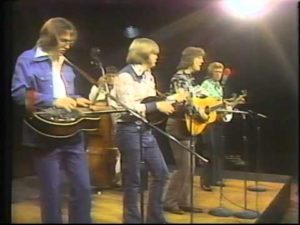As I wrote earlier about being a bluegrass guitarist before a rock guitarist. It’s difficult to have a conversation about Bluegrass music for very long before the name Tony Rice comes into the conversation. He was a polarizing figure among players. He went beyond traditional Bluegrass. Rice was born in Danville, Virginia but grew up in Los Angeles, California. That fact had a profound effect on his influences.
I recall when the “New Grass” Movement had truly hit stride in the world of the 1980s. My Dad and I were in master Banjo maker Geoff Stelling’s workshop as we had him duplicating a Banjo neck from a 1920’s Vega. Bela Fleck was a new name in the Big picture and He asked me what I thought of the progressive movement. I replied, “I hate Mathematics.” He and my Dad had a good chuckle. That fruition began a long time before Radio and T.V Really became aware of what they were involved with. It was there, but the discussions among the Traditional Bluegrass players had been happening for years.
In time Rice moved to Kentucky and began to work with J.D. Crowe and that was the seed for many a player to expand. In the Mid 70’s it was already a progression and it was loved or hated. Crowe eventually would incorporate electric instruments and even drums and Rice exited that chapter.
Crowe & The New South 1975 – JD Crowe,Tony Rice, Ricky Skaggs, Jerry Douglas, Bobby Slone
Rice had known and admired players like Clarence White and David Grisman. As part of the David Grisman Quintet, in order to broaden his expertise and make himself more marketable, Rice began studying chord theory, learned to read charts, and began to expand his playing beyond bluegrass.
Renowned guitarist John Carlini came in to teach Rice music theory, and Carlini helped him learn the intricacies of jazz playing and musical improvisation, in general. The David Grisman Quintet’s 1977 debut recording is considered a landmark of acoustic string band music.
With the Tony Rice Unit, he pursued experimental “space grass” music on Mar West, Still Inside, and Backwaters. Members of the Unit included Jimmy Gaudreau (mandolin), Wyatt Rice (guitar), Ronnie Simpkins (bass), John Reischman (mandolin), and Rickie Simpkins (fiddle). In the late 1980s, Alison Krauss played regularly with the group in concert for about a year but never appeared on the albums. Alison Brown also guested with the group during that period.
Tony Rice Strawberry ’86
Rice had a successful run as a solo artist and collaborated with many, Notably Grisman and Jerry Garcia on what was to later be called “The Pizza Tapes”
Man of Constant Sorrow
The Pizza Tapes – The Real Story
In 1994 he was diagnosed with a disorder known as muscle tension dysphonia which robbed his singing style. A decade later he was also faced with lateral epicondylitis (“tennis elbow”) made guitar playing painful and Rice’s last performance playing guitar live was his induction into the International Bluegrass Music Hall of Fame in 2013.
Tony Rice was a driving influence on so many players and I have no doubt that generations ahead will pick up on his work. Guaranteed without Tony there would be no Billy Strings.
I met Rice one time at a festival. I spoke to him, he did not acknowledge it and gave me a dirty look, and walked away. Regardless, I honor his musicianship. Everyone has their days.
